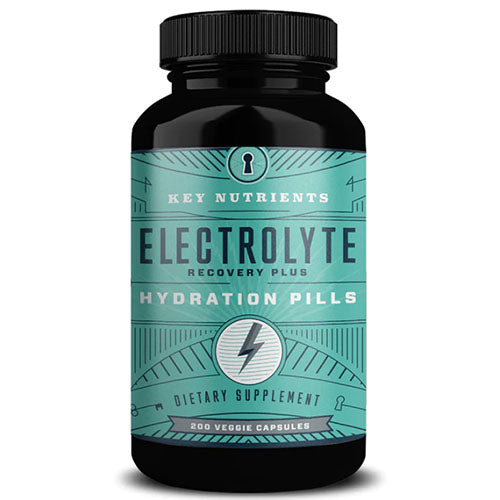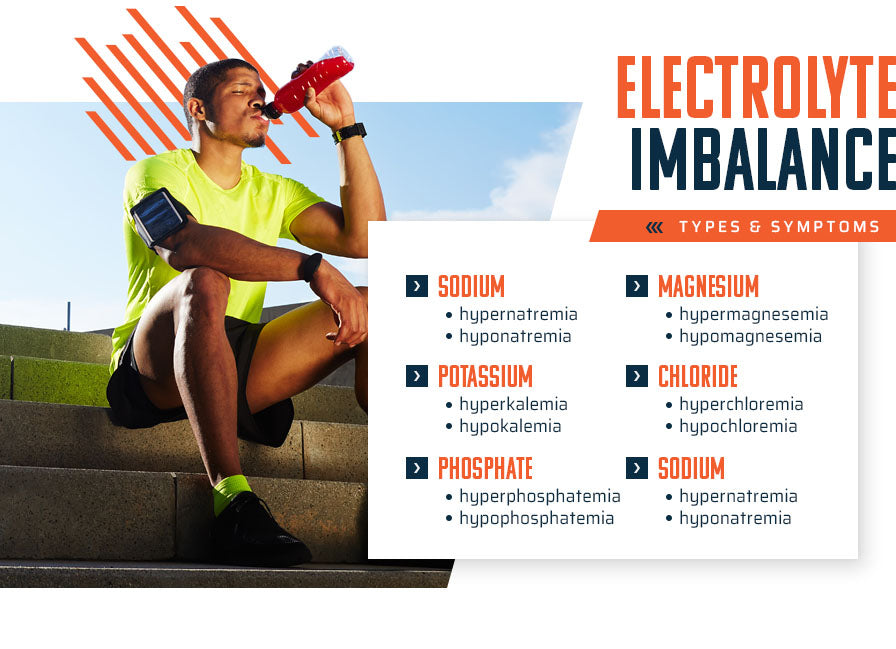
What Causes Electrolyte Imbalance?
Share

Electrolyte imbalance can be a serious issue, but it's one that many people don't know enough about. This article will help to change that by providing an overview of what electrolyte imbalance is, the symptoms to watch out for, and how to prevent and treat it. So whether you're someone who likes to stay active or just wants to be prepared in an emergency, read on for everything you need to know about electrolytes.
Electrolytes and Your Body's Health
Electrolytes are minerals that dissolve in water and create electrically charged particles called ions. These ions are essential for many functions in the body, including muscle contraction, nerve function, blood pressure, and hydration. That's why it's necessary to replenish your electrolytes by eating a nutritious diet, drinking fluids like water, and using electrolyte supplements when appropriate. Let's take a closer look at the six main electrolytes, their daily recommended intakes, and how they impact your health.
Calcium
Calcium is one of the most abundant minerals in the body and is essential for bone health. It's especially important for maintaining bone density and preventing stress fractures. Calcium also plays a role in muscle contraction, nerve function, and blood clotting. The recommended daily calcium intake is 1,000 mg for adults under 50 and 1,200 mg for those 50 and older. Foods rich in calcium include dairy products, like milk and yogurt, and leafy green vegetables, such as kale and spinach.
Chloride
Chloride is an electrolyte that works closely with sodium to maintain the body's fluid balance. It's also necessary for proper muscle function and stomach acid production in digesting food. The recommended daily intake of chloride is 2,300 mg for adults. Good sources of chloride include table salt, seaweed, and olives.
Magnesium
Magnesium is a mineral involved in over 300 biochemical reactions in the body. It helps regulate blood sugar levels, blood pressure, and muscle and nerve function. It's also been shown to help improve exercise performance, reduce inflammation, and improve sleep quality. The recommended daily magnesium intake is up to 400 mg for adults, depending on sex and pregnancy status. Good sources of magnesium include leafy green vegetables, nuts and seeds, whole grains, and beans.

Phosphate
Phosphate is another electrolyte that works closely with calcium to maintain healthy bones and teeth. Phosphate is also involved in cell function, energy production, and DNA synthesis. The recommended daily intake of phosphate is 700 mg for adults. Good phosphate sources include meat, poultry, fish, eggs, dairy products, and nuts.
Potassium
Potassium is essential for proper cell function, plays a role in muscle contractions (including heart contractions), and helps regulate fluid balance in the body. The recommended daily intake of potassium is 1,600 to 2,000 mg for adults. Good sources of potassium include fruits (especially dried fruits), vegetables (especially leafy greens), meat, poultry, fish, beans, lentils, nuts, seeds, whole grains, and dairy products.
Sodium
Sodium is an electrolyte that many people have probably heard bad things about because of issues with high blood pressure. However, sodium is essential for proper fluid balance in the body. In addition, it plays a role in muscle contraction and nerve function. The recommended daily intake of sodium is 2,300 mg for adults. Good sources of sodium include table salt, soy sauce, fermented foods (like kimchi), and cottage cheese.

Causes of Electrolyte Imbalance
Electrolyte imbalance can be caused by various factors, including dehydration, illness, and medication. Some diseases and conditions can also lead to electrolyte imbalance. Let's take a closer look at some of the most common causes of electrolyte imbalance.
Restrictive diets coupled with vigorous exercise.
Some people who are trying to lose weight or get in shape resort to restrictive diets that eliminate certain food groups or severely limit caloric intake. While this may lead to weight loss in the short term, it can also cause electrolyte imbalance. This is because when you restrict your diet, you will also likely eliminate important electrolytes like sodium, potassium, and magnesium. Furthermore, you lose even more electrolytes through sweating when you couple restrictive diets with vigorous exercise.
High-intensity training and high-endurance sports.
Electrolyte imbalance can also be caused by high-intensity training or participating in high-endurance sports. It's even more prominent in those without proper training or who haven't adequately prepared for the activity, event, or sport. If you are not used to exercising at such a high level, your body will not be able to handle the increased demand for electrolytes, and you won't be aware of how to replenish them properly.
Injuries, especially burns.
When you experience an injury, your body goes into repair mode. This process requires a lot of energy and can lead to electrolyte imbalances. Burns are especially susceptible to this because they cause extensive tissue damage. Therefore, if you have recently suffered an injury, drink plenty of fluids and eat a balanced diet to help your body recover.
Illness that includes vomiting, diarrhea, and sweating.
Certain illnesses like influenza that cause diarrhea, vomiting, and fever can cause dehydration and lead to electrolyte imbalance. This is because when you are ill, your body loses fluids through sweating and increased elimination.

Hormonal disorders.
Addison's disease or Cushing's syndrome, which are disorders that affect the adrenal glands, can cause electrolyte imbalance. This is because these disorders disrupt the body's hormone production, leading to increased sodium and water loss.
Certain medications and medical conditions.
Some medications, such as diuretics, steroids, and cancer treatments, can cause electrolyte imbalance. In addition, medical conditions such as kidney problems, liver problems, hyperaldosteronism, hypothyroidism, and diabetes can also cause electrolyte imbalance.
This is because these medications and conditions can interfere with the body's ability to absorb or excrete electrolytes. Therefore, if you have pre-existing medical conditions or are taking medications, you must speak with your doctor about maintaining proper electrolyte balance.
Excessive alcohol consumption and chronic alcohol abuse.
Alcohol is a diuretic, which increases urine output and can lead to dehydration. Chronic alcohol abuse can also damage the liver, which is responsible for removing toxins from the body. This can lead to a buildup of toxins in the body, including electrolytes. If you're drinking alcohol excessively, try cutting back or quitting altogether. If you're struggling with alcoholism, please seek professional support. Never be embarrassed to ask for help — many people need it, and there is no shame in getting the help you need to live a healthier life.
Eating disorders and laxative abuse.
Eating disorders such as anorexia nervosa and bulimia nervosa can cause electrolyte imbalances due to self-imposed starvation or purging through vomiting or diarrhea. Laxative abuse can also lead to electrolyte imbalances due to dehydration and malnutrition. If you or someone you know is struggling with an eating disorder, please seek professional help. Again, you deserve help and support, and there is no shame in reaching out for assistance.

Types of Electrolyte Imbalance and Symptoms
Electrolyte imbalances are generally classified into one of two groups. Either you have below or under normal levels — hypo — or above or above normal levels — hyper. Here are examples for each of our big six electrolytes and associated electrolyte imbalance symptoms:
Sodium – hypernatremia and hyponatremia.
Hyponatremia is an electrolyte imbalance where you have below-normal sodium levels in your blood. This can be caused by drinking too much water, which dilutes the sodium in your body. It can also be caused by medications, medical conditions, and hormone disorders. Symptoms of hyponatremia include headaches, confusion, fatigue, muscle weakness, and seizures.
Hypernatremia is an electrolyte imbalance where you have above-normal levels of sodium in your blood. This is usually caused by dehydration from sweating, vomiting, or diarrhea. However, it can also be caused by certain medications and medical conditions. Symptoms of hypernatremia include thirst, dry mouth, headache, irritability, and confusion.
Potassium – hyperkalemia and hypokalemia.
Hypokalemia is an electrolyte imbalance where you have below-normal potassium levels in your blood. This can be caused by medications, medical conditions, and hormone disorders. Symptoms of hypokalemia include muscle weakness, fatigue, heart palpitations, and tingling or numbness.
Hyperkalemia is an electrolyte imbalance where you have above-normal levels of potassium in your blood. This can be caused by certain medications that impact your kidneys, diets overly high in potassium, and kidney problems. Symptoms of hyperkalemia include muscle weakness, chest pains, shortness of breath, and irregular heartbeat. In severe cases, it may cause a heart attack.
Phosphate – hyperphosphatemia or hypophosphatemia.
Hypophosphatemia is an electrolyte imbalance where you have below-normal phosphate levels in your blood. This can be caused by malnutrition, alcoholism, and certain medical conditions that require diuretic use. Symptoms of hypophosphatemia include brain fog or confusion, muscle weakness, bone pain and fractures, chronic fatigue, and mood fluctuations.
Hyperphosphatemia is an electrolyte imbalance where you have above-normal levels of phosphate in your blood. This can be caused by certain medications that impact your kidneys, kidney problems, hypoparathyroidism, and metabolic or respiratory acidosis. It may also be due to genetic causes. Symptoms of hyperphosphatemia include muscle cramps and spasms, itchy skin, and bone or joint pain. In severe cases, it may cause coma, seizures, or death.

Magnesium – hypermagnesemia and hypomagnesemia.
Hypomagnesemia is an electrolyte imbalance where you have below-normal magnesium levels in your blood. This can be caused by alcoholism, gastrointestinal disease, malnutrition, and certain medications and medical conditions. Symptoms of hypomagnesemia include muscle cramps and spasms, anxiety, nystagmus (rapid and abnormal eye movements), irregular heartbeat, and seizures.
Hypermagnesemia is an electrolyte imbalance where you have above-normal levels of magnesium in your blood. This can be caused by certain medications that impact your kidneys, kidney problems, or metabolic acidosis. It can also result from medications that introduce abnormal amounts of magnesium into your system. Symptoms of hypermagnesemia include low blood pressure, nausea, vomiting, diarrhea, muscle weakness, headache, and difficulty breathing.
Chloride – hyperchloremia and hypochloremia.
Hypochloremia is an electrolyte imbalance where you have below-normal chloride levels in your blood. This can be caused by dehydration, malnutrition, medications, and medical conditions. It is most likely to occur with prolonged diarrhea and vomiting while ill or in conjunction with kidney problems and chronic respiratory acidosis. Symptoms of hypochloremia include muscle cramps and spasms, fatigue, confusion, and heart palpitations.
Hyperchloremia is an electrolyte imbalance where you have above-normal levels of chloride in your blood. This can be caused by certain medications that impact your kidneys, diets overly high in sodium, kidney problems, or bromide poisoning (due to bromide-containing drugs). Symptoms of hyperchloremia include thirst, dry mouth, headache, irritability, and confusion.
Calcium – hypercalcemia and hypocalcemia.
Hypocalcemia is an electrolyte imbalance where you have below-normal calcium levels in your blood. This can be caused by vitamin D deficiency, certain medical conditions like hypoparathyroidism, malabsorption syndromes, and certain medications. Symptoms of hypocalcemia include muscle cramps and spasms, anxiety, irregular heartbeat, and seizures.
Hypercalcemia is an electrolyte imbalance where you have above-normal levels of calcium in your blood. This can be caused by certain medications that impact your bones or parathyroid gland, cancer, kidney problems, or hyperparathyroidism. Symptoms of hypercalcemia include excessive thirst, frequent urination, nausea and vomiting, constipation, abdominal pain, confusion, and fatigue.
Avoid Electrolyte Imbalance by Using Flavorful Electrolyte PowderMonitoring Your Electrolytes
There are no home test kits for electrolytes, so it's essential to know your body and medical history. If you have any medical conditions that might affect your electrolyte levels or frequently participate in endurance activities where you can lose electrolytes through sweating, it's especially important to monitor your levels and consult your doctor.

10 Tips for Prevention and Treatment of Electrolyte Imbalance
- Drink plenty of fluids throughout the day. This will help ensure that you're properly hydrated and will also help flush out any electrolytes that might be out of balance.
- Eat a balanced diet that includes plenty of fruits and vegetables. These foods contain high levels of sodium, potassium, and calcium, which are important electrolytes for muscle function.
- Avoid sugary drinks like soda, which can cause dehydration and make it harder for your body to absorb electrolytes.
- If you feel like you might be coming down with something or experiencing unusual fatigue, check in with your doctor and, if necessary, get a blood test. Sometimes electrolyte imbalances, such as those felt by the keto flu, can cause these symptoms. Adding electrolyte powder to your routine can help.
- Use an electrolyte powder mixed with water after workouts or during extended periods of activity. This supplement will help replenish the electrolytes you lose through sweat and improve hydration.
- If you experience cramping, nausea, or headache after extended activity, try taking electrolyte pills or tablets. These can help replenish electrolytes and make you feel better quickly. They're also portable and convenient, meaning you can take them on the go.
- Monitoring your electrolyte levels is especially important during hot weather or if you live in a climate with high humidity. In these conditions, you sweat more and are at risk for dehydration and heat exhaustion if you don't stay hydrated and replenish lost electrolytes.
- If you have any medical conditions that might affect your electrolyte levels — such as diabetes, kidney disease, or hypertension — be sure to talk to your doctor about how to best monitor your condition and what signs to look out for.
- Some medications can also affect your electrolyte levels. Be sure to ask your doctor or pharmacist about possible side effects before starting any new medication or after changing your dosage. Never discontinue or adjust your medication dosage without first talking to your doctor.
- If you experience severe symptoms of an electrolyte imbalance — such as seizure, irregular heartbeat, or muscle weakness — call 911 or go to the nearest emergency room immediately. These symptoms can be life-threatening and require immediate medical attention.

Understanding Electrolyte Imbalance: Your Roadmap for Better Health
We hope this article has helped you better understand electrolyte imbalance and how it affects your health. It's vital to be proactive about monitoring your electrolytes and taking steps to prevent and treat any imbalances.
One of the best ways to do this is by adding an electrolyte supplement to your daily routine. Doing so can help ensure that your body has all the nutrients it needs to function at its best. If you're interested in trying an electrolyte supplement, we recommend checking out our line of keto-friendly products and wellness supplements. Our powders and capsules are designed specifically for those who train hard and contain all the essential minerals and vitamins needed to support optimal health while pursuing a healthier lifestyle. Thanks for reading — and we wish you the best of luck on your journey to better health.
Image Credits
Keattichai permpakdee/Shutterstock.com
GaudiLab/Shutterstock.com
Jacob Lund/Shutterstock.com
Gorodenkoff/Shutterstock.com
Ivanko80/Shutterstock.com
EugeneEdge/Shutterstock.com
Yuri A/Shutterstock.com
